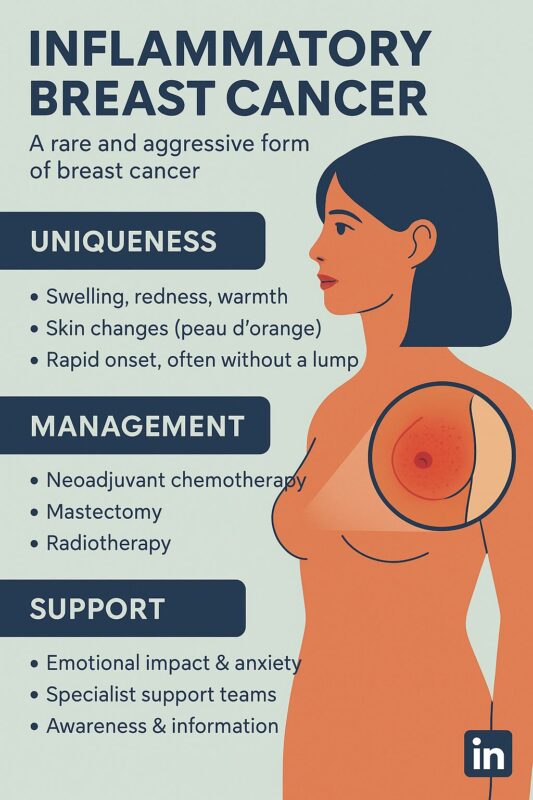
Olubukola Ayodele/LinkedIn
May 12, 2025, 09:58
Olubukola Ayodele: Not All Breast Cancers Present as a Lump
Olubukola Ayodele, Consultant Medical Oncologist at the University Hospitals of Leicester NHS Trust, shared a post on LinkedIn:
“When most people think of breast cancer, they think of a lump. But not all breast cancers present this way and one of the most aggressive and misunderstood forms is Inflammatory Breast Cancer (IBC).
As a breast oncologist, I often meet patients who say, “I knew something was wrong, but it didn’t feel like breast cancer.”
What makes IBC so different is not just its biology, but how quickly it progresses and how easily it’s overlooked.
So what is Inflammatory Breast Cancer?
IBC accounts for only 1-5% of all breast cancers, but it’s disproportionately aggressive. It tends to:
– Grow rapidly
– Block lymph vessels in the skin of the breast
– Cause the breast to appear red, swollen, warm, and “inflamed”
– Be diagnosed at a more advanced stage, often stage III or IV
– Lack a distinct lump, leading to delayed detectionSymptoms may include:
– Redness or a rash that resembles an infection
– Swelling or thickening of the breast (often over days or weeks)
– Skin that looks like orange peel (peau d’orange)
– Nipple changes or flattening
– Sometimes, pain or itchingThese symptoms can mimic mastitis or skin irritation, which is why awareness among both the public and healthcare professionals is vital. Time is of the essence with IBC.
How is IBC managed?
Treatment for IBC is aggressive and typically involves:
1. Chemotherapy first (to shrink the cancer)
2. Surgery (usually mastectomy)
3. Radiotherapy (to reduce local recurrence)
4. Often targeted therapy or hormonal therapy depending on the cancer’s biologyBecause IBC often presents at an advanced stage, patients require multidisciplinary, coordinated care and robust psychosocial support. The emotional impact of a rapid, complex diagnosis can be overwhelming and patients need clear communication, fast action, and holistic support.
Here’s what I want you to remember:
– Not all breast cancers form lumps. Believe women when they say “something feels wrong,” even in the absence of a lump.
– If you notice persistent redness, swelling, or skin changes, don’t wait, get checked immediately.IBC may be rare, but for those affected, it’s life-altering and they deserve awareness, timely diagnosis, and equitable access to care. They often feel a sense of isolation due to its rarity and lack of public awareness. Peer groups and charities focused on IBC can also be lifelines.
As clinicians, advocates and allies, let’s amplify awareness and ensure that every form of breast cancer is seen, heard, and addressed with the urgency and empathy it demands.
Kindly repost to inform and educate a wider audience.”

More posts featuring Olubukola Ayodele.
-
Challenging the Status Quo in Colorectal Cancer 2024
December 6-8, 2024
-
ESMO 2024 Congress
September 13-17, 2024
-
ASCO Annual Meeting
May 30 - June 4, 2024
-
Yvonne Award 2024
May 31, 2024
-
OncoThon 2024, Online
Feb. 15, 2024
-
Global Summit on War & Cancer 2023, Online
Dec. 14-16, 2023
Sep 2, 2025, 22:37
Sep 2, 2025, 22:03
Sep 2, 2025, 20:50
Sep 2, 2025, 18:53
Sep 2, 2025, 16:54
